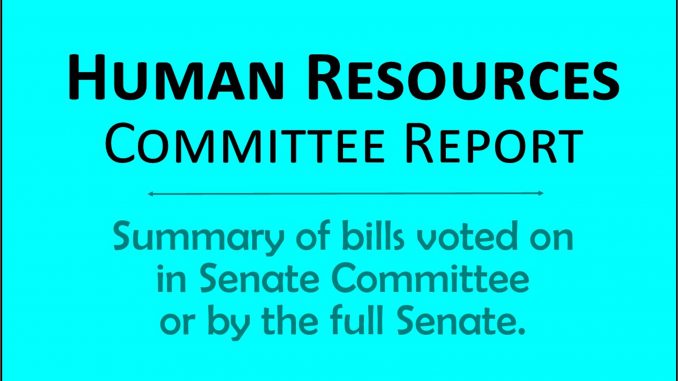
SF 2092 — Health Homes;
SF 2221 — Managed Care Policies and Procedures;
SF 2252 — Mental Health Redesign Complex Needs Workgroup Recommendations;
SSB 3072 — Board of Pharmacy Membership and Wholesaling Policies;
SSB 3073 — Board of Pharmacy Controlled Substance Schedules and Discipline;
SSB 3074 — Electronic Prescription Filing;
SSB 3122 — Medical Cannabidiol Fees and Background Checks;
SSB 3125 — Stroke Care;
SSB 3126 — Hospice Payments;
SSB 3127 — Mandatory Reporter Training Workgroup;
SSB 3168 — Healthcare Professions Loan Programs.
COMMITTEE ACTION:
SF 2092 directs the Iowa Department of Human Services (DHS) to require managed care organization to keep Integrated Health Homes in place. DHS must do a comprehensive evaluation on the health homes, and no changes can be made until they are approved by the Administrative Rules Review Committee. An amendment applies this directive to Integrated Health Homes, Chronic Care Health Homes and Pediatric Health Homes.
[2/12: short form]
SF 2221, as amended, requires the Medicaid managed care organizations to give a 60-day notice regarding any changes in policies or procedures. The bill also requires payments within 45 days and appeals to be resolved within 90 days.
[2/14: short form]
SF 2252 is based upon the Complex Needs Workgroup recommendations. The workgroup was established last year in SF 504. The full report is at www.legis.iowa.gov/docs/publications/DF/865801.pdf. Recommendations include establishing six access centers; 22 Assertive Community Treatment (ACT) teams; and intensive residential service homes that provide for up to 120 people statewide. The new services depend on continuing matching funds for the Iowa Health & Wellness Plan (Medicaid expansion). The subacute bed cap of 75 is eliminated. The bill raises the cap on mental health region reserve funds from 25 percent to 30 percent. An amendment broadened the definition of seriously mentally impaired in Chapter 229 and allows oral medications in addition to injectables as treatment options.
[2/14: short form]
SSB 3072 adds a certified pharmacy technician to Board of Pharmacy; updates wholesale transactions to be in compliance with federal Drug Supply Chain Security Act; creates a new category of “third-party logistics” provider; and amends the section on “limited drug and device distributor” for those that don’t meet the definition of wholesaler.
[2/13: short form]
SSB 3073 updates controlled substance schedules and discipline; matches the Iowa schedule to the federal schedule; removes the word “biennial” to allow coordination with other concurrent licenses; adds discipline to the available sanctions the Pharmacy Board can use for violations; and changes procedures for sanctioning a Controlled Substances Act registrant from “order to show cause” to “contested case proceeding.”
[2/13: short form]
SSB 3074 requires that prescriptions be submitted electronically. An amendment delays implementation to January 1, 2020, and relieves pharmacists from verifying written prescriptions used in some cases.
[2/13: short form]
SSB 3122 relates to collecting fees and performing background investigations under the Medical Cannabidiol Act.
[2/13: short form]
SSB 3125 requires recognition from the Joint Commission on the Accreditation of Health Care Organizations; requires the Iowa Department of Public Health to recognize comprehensive and primary stroke centers; and requires regional emergency medical services programs to develop and use stroke triage and transport protocols.
[2/13: short form]
SSB 3126 deals with reimbursements for dually eligible hospice patients. Payment will go directly to the nursing facility without passing through the hospice agency.
[2/13: short form]
SSB 3127 requires the Department of Human Services to facilitate a workgroup during the interim on mandatory child abuse reporter training.
[2/13: short form]
SSB 3168 allows the College Student Aid Commission to combine several educational assistance programs into one program, and reduces the maximum amount of aid. Combined programs are registered nurses, nurse educators, advanced registered nurse practitioners, doctors of nursing and physician assistants.
[2/14: short form]
